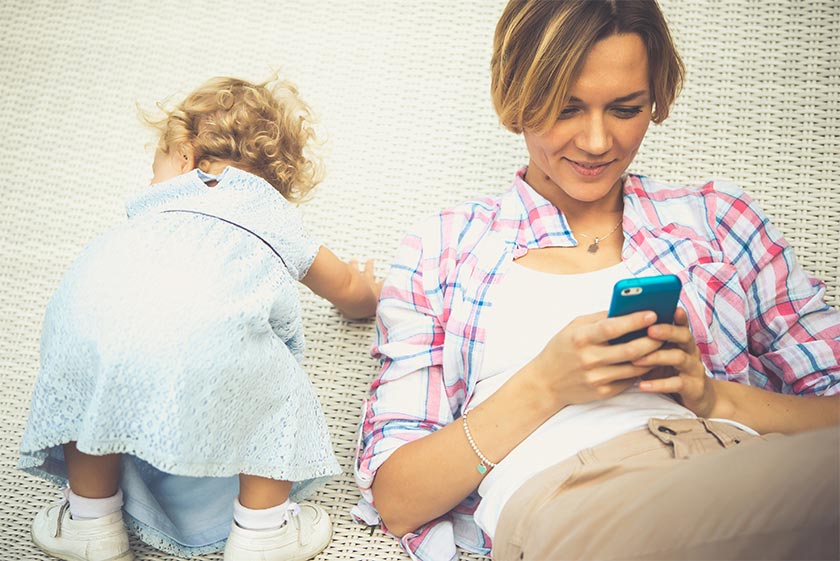Social media is a daily part of life for many of us. For new parents it is often used as a ‘highlights reel’ of their new lives with their baby. It can also be a way to make connections and find a sense of community that can sometimes feel absent during this time of transition.
Social media for social support
For parents who are geographically or socially isolated, social media can provide a sense of connectedness, particularly for those living in more rural areas where face-to-face support groups may be few and far between.
There are social media groups that cover a range of different parenting and pregnancy related topics such as fertility challenges, medical concerns (both for mums, dads and baby), infant development and multiple births to name a few.
These groups connect parents who are in similar circumstances allowing them to share experiences, recommendations and support.
The challenge
It can be hard to find the balance between positive screen time and excessive use. Whilst social media has the potential to reduce isolation, unrealistic images of a seemingly ‘perfect’ life on social media can lead to mothers making comparisons to their own lives and being left with a sense of inadequacy.
Carefully selected, filtered photos, shared on social media may perpetuate the concept of a ‘perfect’ parent and create unrealistic expectations of parenthood and not reflect any of the more challenging moments of parenting.
This skewed view on parenthood can make it difficult for parents to share their own experiences. It is important to remember that social media provides only a glimpse into a person’s life and not the full picture.
Social media may provide access to resources for parents on infant development, pages for activities to engage children in and peer support.
We know the importance of parents actively engaging with their infants, smiling and playing with them - social media may pose a distraction at times, depending on the frequency of use and how heavily immersed in social media use the parents are.
Being mindful of this can help parents balance the use of social media in day to day life so it not does impact their relationships in a negative way and they still receive the benefits of online engagement.
Finding the balance
There are many factors that contribute to a parent developing perinatal anxiety and depression. We know that social media use is adding to the sense of pressure many new parents feel at a time when they are already experiencing exhaustion, feelings of isolation, and the burden of expectations (of themselves and from others) and this can be detrimental to their mental health.
The benefits versus the challenges of social media depend, in part, on what underlying messages each parent is exposed to during their social media use. We need to better understand each individual’s level of social media engagement, personal experiences and emotional responses in order to contextualise the role of social media in their lives.
Social media use is very common and having a balanced approach to this is important given the level of engagement many parents have with this platform.
Focusing on promoting perinatal and infant mental health services, resources, knowledge and awareness through social media is likely to promote positive outcomes for families.
We are already seeing an emergence of parents connecting over their shared difficulties, as well as their joys, instead of only striving for a picture of perfection.
Hopefully this will lead to open discussions about the more challenging aspects of adjusting to parenthood and reduce stigma for those suffering from perinatal anxiety and depression.
Helplines
PANDA (Monday to Friday: 9.00am to 7.30pm AEST)
Tel: 1300 726 306
Beyondblue (24 hours / 7 days a week)
Tel: 1300 224 636
Mensline (24 hours / 7 days a week)
Tel: 1300 789 978







